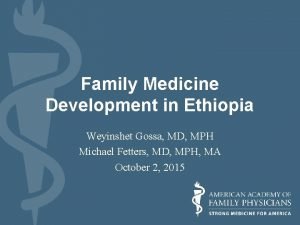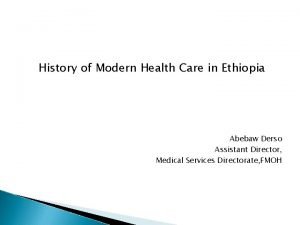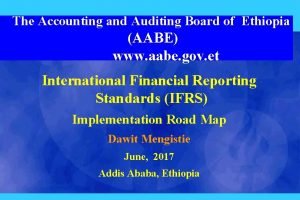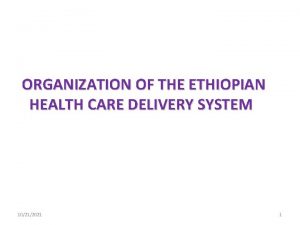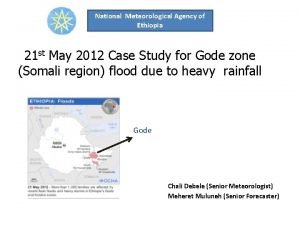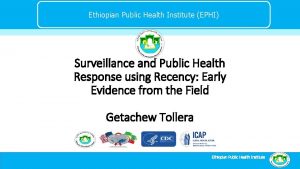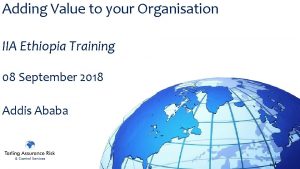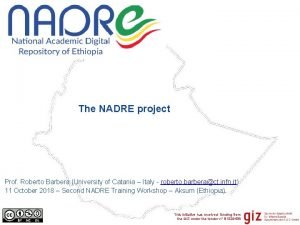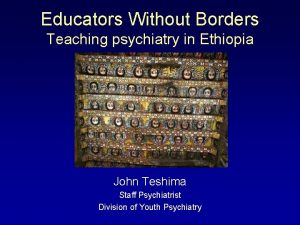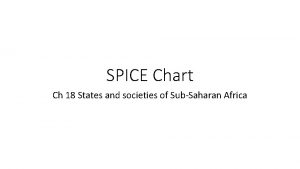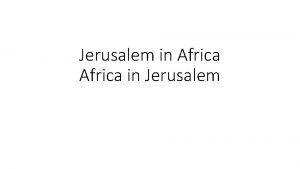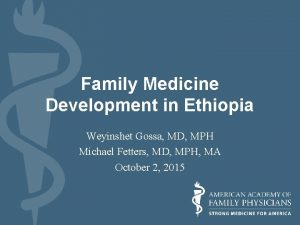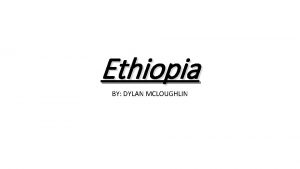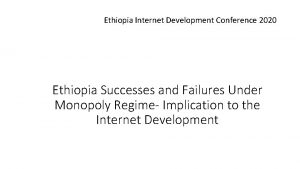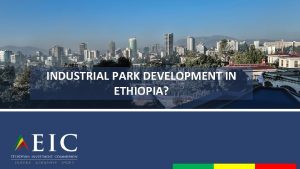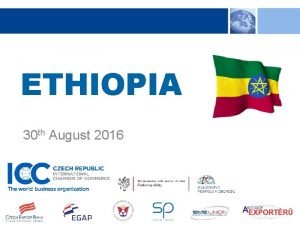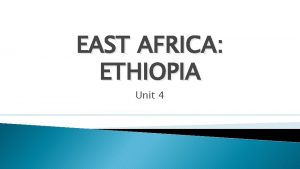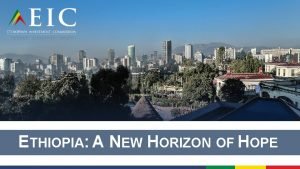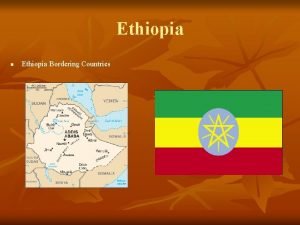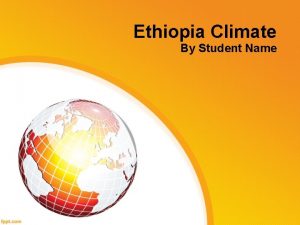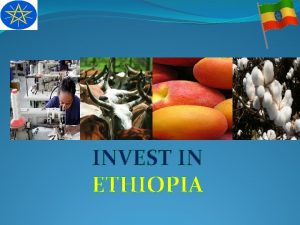Family Medicine Development in Ethiopia Weyinshet Gossa MD
















- Slides: 16

Family Medicine Development in Ethiopia Weyinshet Gossa, MD, MPH Michael Fetters, MD, MPH, MA October 2, 2015

Activity Disclaimer • We have no relevant financial relationships to disclose. 2

Objectives • To give brief background on Ethiopia • To describe Ethiopia’s current health care system • To discuss findings from our research assessing key stakeholders’ perspectives on family medicine development in Ethiopia • To discuss future steps in the development of family medicine in Ethiopia 3

4

Country Profile • • Population - 99 million people Life expectancy - 61 years Under 5 mortality - 64 / 1, 000 live births Maternal mortality - 420 / 100, 000 live births • Burden of diseases - 74% communicable, 20% non communicable, 6% injuries • Health expenditure - 5. 1% of GDP 5

Health Care System • National Health Policy established in 1991 • The Declaration of Alma-Ata of 1978 “Primary health care for all” • Health Sector Development Plan (HSDP) developed in 1993 • 2008 World Health Report – “Primary health care: Now more than ever” 6

Four-tier Health Care System 7

Health Care Workforce 8

Family Medicine in Ethiopia • First family medicine residency program started in 2013 at Addis Ababa University • First class of residents graduating in January of 2016 • There are currently 21 family medicine residents • Two additional programs planned to start at Gondar and Jimma Universities 9

Key Stakeholder’s Perspectives on Development of Family Medicine • Mini-ethnography using long interview and field observations • At St Paul’s Hospital Millennium Medical College, Addis Ababa University, Federal Ministry of Health and Jimma University • Four formal and several informal meetings • Data analyzed using SCOT (Strength, Challenges, Opportunities, Threat) framework 10

Strengths • Ministry of Health is very supportive of family medicine development and expansion • Strong support for family medicine at Addis Ababa University • Strong collaborative international partners • Successful establishment of first family medicine residency program • Support from core specialists • Curriculum and objectives revised regularly 11

Challenges • • Ethiopia’s health care system is under-capacity Family medicine is not well known or understood The roles of family medicine are still evolving Limited numbers of faculty to teach family medicine residents and for mentorship • Limited opportunities for leadership training and faculty development • Competition for learning from other residents • Limited finances, availability of books and online learning resources 12

Opportunities • High need for quality comprehensive primary health care • Increasing number of medical school graduates • • Increasing number of postgraduate training programs Waiver of service obligations if joining family medicine New health centers with better training capacity Gap in care provided by GPs, Health Officers, and health extension workers and specialists • Opportunity to become health care system leaders 13

Threats • Not viewing family medicine as scientific discipline • Specialists, GPs and health extension workers may perceive family physicians as competitors • Potential for undermining local capacity and ownership • Frequent turnover in leadership • Extensive responsibilities could lead to burn out and drop out • Internal and external brain drain 14

Future Steps • Develop common vision for family medicine • Establish policy framework with family medicine at the base of the primary health care system • Continue dialogue on potential roles of family medicine in the broader health care system • Build local capacity and ownership • Develop collaborative relationships with other sub-Saharan African countries 15

References 1. 2. 3. 4. 5. 6. 16 African Health Workforce Observatory AHWHO. Human Resources for Health Country Profile, Ethiopia. 2010; Available from: http: //www. hrhobservatory. afro. who. int/images/Document_Centre/Country_profile_Ethiopia. pdf? ua=. Accessed September 26, 2015. CIA. The World Factbook. https: //www. cia. gov/library/publications/the-worldfactbook/geos/et. html. Accessed 9/26/2015. Federal Democratic Republic of Ethiopia Ministry of Health Sector Development Plan IV 2010/11 – 2014/15. 2010; Available from: http: //www. nationalplanningcycles. org/sites/default/files/country_docs/Ethiopia/ethiopia _hsdp_iv_final_draft_2010_-2015. pdf. Accessed June 5, 2015. Philpott J, Cornelson B, Derbew M, et al. The dawn of family medicine in Ethiopia. Fam Med. Oct 2014; 46(9): 685 -690. WHO. Global Health Observatory (GHO) Data. Ethiopia: country profiles. http: //www. who. int/gho/countries/eth/country_profiles/en/. Accessed 9/26/2015. World Atlas. Ethiopia Large Color Map. http: //www. worldatlas. com/webimage/countrys/africa/lgcolor/etcolor. htm. Accessed 9/26/2015.
 Family medicine in ethiopia
Family medicine in ethiopia Modern medicine in ethiopia
Modern medicine in ethiopia Accounting and auditing board of ethiopia website
Accounting and auditing board of ethiopia website Six tier health system in ethiopia
Six tier health system in ethiopia Ethiopian meteorological agency
Ethiopian meteorological agency Hiv case-based surveillance in ethiopia
Hiv case-based surveillance in ethiopia Iia ethiopia
Iia ethiopia Prof barbera
Prof barbera Health sector transformation plan ii ethiopia
Health sector transformation plan ii ethiopia Psychiatry in ethiopia
Psychiatry in ethiopia Mali empire spice chart
Mali empire spice chart Ethiopia street jerusalem
Ethiopia street jerusalem Esap ethiopia
Esap ethiopia Ethiopia water
Ethiopia water Challenges of interest free banking in ethiopia
Challenges of interest free banking in ethiopia Ethiopia constitution
Ethiopia constitution Sher ethiopia plc
Sher ethiopia plc
